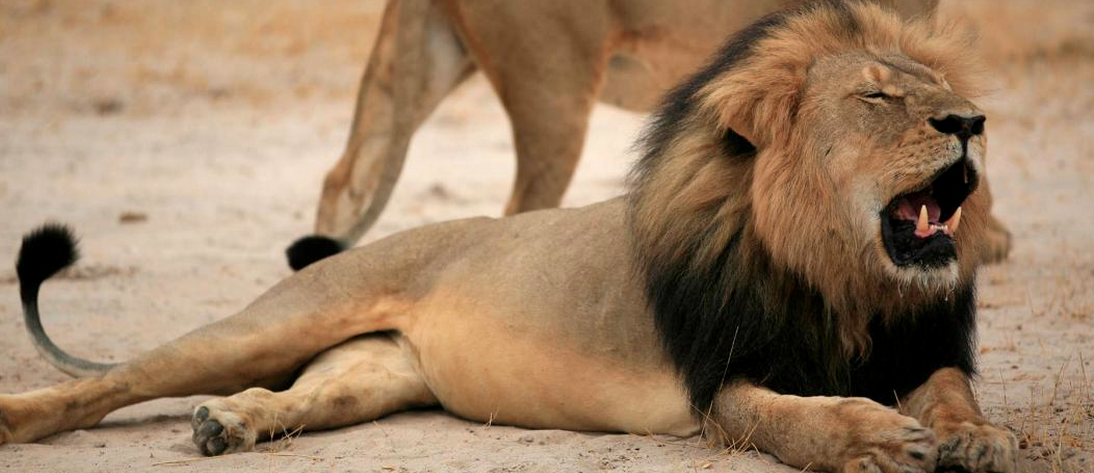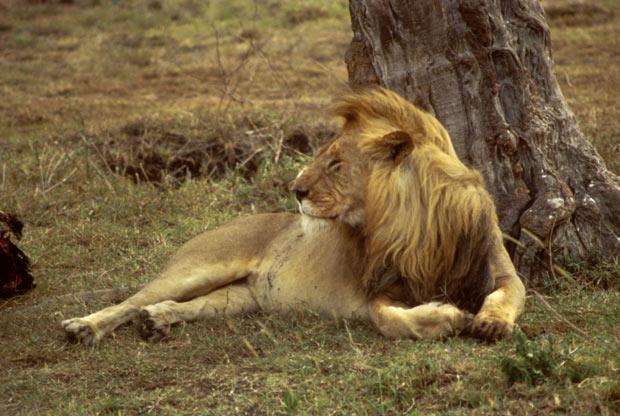.
Rebecca Francis accuses Ricky Gervais of using ‘influence’ to target female hunters: image via The Independent @independent, 15 April 2015
Zimbabwe's 'iconic' #CecilTheLIon killed by hunter: image via NewsDay @NewsDayZimbabwe, 29 July 2015
can't believe this man counted it as valor to lure #CecilTheLIon out of his protective home and kill him. #Cowardice: image via MC HAMMER @MCHammer, 28 July 2015
#CecilTheLion: The last known photograph: image via the Telegraph @Telegraph, 29 July 2015
Only a monster could kill such a majestic beautiful animal we share this world with. RIP #CecilTheLion: image via mike @WhiskeySoured, 28 July 2015
The hunter who killed Cecil the Lion doesn't deserve our empathy: Rose George, The Guardian, 29 July 2015
We love a good fight, don’t we? Enter Walter J Palmer, a tanned dentist from Minnesota, with a bow and arrow. Along comes Cecil the lion, the alpha male of his pride, minding his own business being the best-known and most beloved lion in Zimbabwe if not in Africa, as well as the subject of an Oxford University study. Then Cecil is shot with a bow and arrow, taking 40 hours to die, all because Palmer thought killing a magnificent animal was sporty.
I read the story of Cecil’s killing and my education and intellect deserted me for a minute. I felt only disgust and rage, somewhat inarticulately. I feel no calmness about big-game hunters. I am not persuaded by their justifications, which can be easily punctured with buckshot. Trophy hunting contributes to conservation, they say: when the Dallas Safari Club auctioned the right to kill an endangered Namibian black rhino, it said the $350,000 winning bounty -- they called it a “bid” -- went towards conservation efforts in Namibia. There are only 5,000 black rhinos left.
The population of African lions has been reduced by 50% in the last three decades, says the International Fund for Animal Welfare, and there are now only 32,000. Elephants, leopards, polar bears and giraffes are all hunted for “sport” too. Shooting an endangered species and calling it sustainable is like waving a fan and thinking you’re helping to stop global warming.
Rebecca Francis accuses Ricky Gervais of using ‘influence’ to target female hunters: image via The Independent @independent, 15 April 2015
In April, after Ricky Gervais tweeted a picture of the blonde, pretty Rebecca Francis lying next to a dead giraffe she had just shot, the internet went ape. Arguably, it went more ape than it would have if she hadn’t been female, and you can find plenty of earnest essays about how women have the right to be big-game hunters without getting an online hounding. I don’t care what gender she was. I care that afterwards, she declared that she had done a good thing.
The giraffe was elderly, she wrote, and was going to die soon. By shooting him, she had honoured his life by making his body useful to locals: his tail could make jewellery and his bones could make “other things”. “I’m no game biologist,” she wrote, but “there is no question that hunters contribute the most to the welfare of wildlife.”
Follow this argument further and you reach the reasoning that poaching and trafficking do more harm than big-game hunting. True. Wildlife trafficking is worth $7-10bn, and is the fifth most profitable illegal market worldwide. Yet in many countries where poaching is rampant, policing is patchy and punishment often nothing more than a fine. Yes, poaching is more damaging than trophy hunting. Murder is worse than grievous bodily harm, technically, but I’m comfortable strongly objecting to both.
But violently objecting to hunters can be almost as bad as hunting. Most public displays of big-game hunting attract fury and sometimes death threats, as Palmer has been subjected to since his identity was revealed. The fact that African countries such as Namibia and Zimbabwe sell licences to shoot their own big game gets less attention.
Palmer is said to be “quite upset,” but only because he got the wrong lion. He blamed his guides for this, rather than his own bizarre and repellent desire to augment his own self-worth (somewhat damaged, now, by a campaign to shut down his dental practice) by killing another creature. Francis was compelled to release a statement saying that she “couldn’t understand how people who claim to be so loving and caring for animals can turn around and threaten to murder and rape my children.”
Let’s not turn Palmer and Francis into trophies too, repugnant though their actions are. I don’t want to understand them or empathise. I’d rather not attempt to comprehend the inexplicable act that is the murder of animals for fun. But trophy hunting is about something bigger than that: an assumption that all animals are at our service, and ignoring the fact that we are just clever animals too.
Here is a product of my superior animal brain: a plan. If you’re going to pay $50,000 towards conservation efforts by shooting a lion, then give the money and don’t shoot. Preserving life, by killing fewer animals –- now that would be worth a trophy.
Zimbabwe's 'iconic' #CecilTheLIon killed by hunter: image via NewsDay @NewsDayZimbabwe, 29 July 2015
The absence of a predatory instinct in the great ape's genetic makeup was always going to be a problem once the descent from the trees to the forest floor had taken place. Paleolithic man compensated for this lack by displacing patterns of intra-species aggression and redirecting them toward other species.
Thus was born hunting, a conduct in which the characteristics of an equal are projected upon the prey, which thus becomes an "enemy". Killing your enemy is OK. From animal sacrifice, in turn, is born religion.
This is the thesis of Walter Burkertin his profound study of ancient Greek myth and religion, Homo Necans: the Anthropology of Ancient Greek Sacrificial Ritual and Myth (1992).
Homo Necans means man the killer. Short sentence. Capital offense.
You might say that's putting a fine point on it. Or then again you might say, well, that's just connecting the dots.
This is the thesis of Walter Burkertin his profound study of ancient Greek myth and religion, Homo Necans: the Anthropology of Ancient Greek Sacrificial Ritual and Myth (1992).
Homo Necans means man the killer. Short sentence. Capital offense.
You might say that's putting a fine point on it. Or then again you might say, well, that's just connecting the dots.
can't believe this man counted it as valor to lure #CecilTheLIon out of his protective home and kill him. #Cowardice: image via MC HAMMER @MCHammer, 28 July 2015
#CecilTheLion: The last known photograph: image via the Telegraph @Telegraph, 29 July 2015
American Hunter Killed Cecil, Beloved Lion That Was Lured Out of Its Sanctuary: Katie Rogers, New York Times, 28 July 2015
Cecil, a 13-year-old lion, wandered out of his sanctuary in a national park in Zimbabwe this month, following the scent of a potential snack.
At the other end of Cecil’s search was a lure, placed there by hunters who, conservationists say, wanted their prey to cross into unprotected territory so they could kill him.
Cecil, well known to those who visited the Hwange National Park in western Zimbabwe for his jet black mane, was beheaded, according to conservation officials. His corpse was left to rot in the sun.
Zimbabwean officials said that Dr. Walter J. Palmer, an American hunter known for killing big game with a bow and arrow, killed Cecil, and was being sought on poaching charges.
Johnny Rodrigues of the Zimbabwe Conservation Task Force said Cecil was lured out of a protected game preserve one night in early July by a hunting party that tied a dead animal to a car.
The first shot, which the authorities say came from Dr. Palmer’s crossbow, was not enough to kill the lion. Cecil was tracked for nearly two days before Dr. Palmer killed him with a gun.
The details of the lion’s death have outraged nature enthusiasts and conservationists around the world who are troubled by wealthy big-game hunters who pay tens of thousands of dollars for licenses to kill protected animals for trophies and sport.
Hunting advocates and some conservationists argue that, if done responsibly, the selling of expensive licenses to big-game hunters can help pay for efforts to protect endangered species. In 2013, the Dallas Safari Club in Texas fought for the right to sell at auction a permit for the hunting of a black rhino in Namibia, setting off a debate over the practice.
The group argued that a limited hunt helped thin the herd of weak rhinos so the population could grow, and that the $350,000 paid in 2014 by a reality show host to hunt the animal would help fund Namibia’s conservation efforts.
In 2009, Dr. Palmer, a dentist from Minnesota, paid $45,000 at an auction to help preserve an elk habitat in California.
A big-game hunter who prides himself on his skills in hunting without firearms, Dr. Palmer was profiled in 2009 in The New York Times, when he shot an elk from 75 yards with a compound bow in pursuit of a new bowhunting record. The Telegraph in Britain reported on Tuesday that he paid around $54,000 for the opportunity to hunt a lion.
#CecilTheLion was killed for 'sport', now @piersmorgan and @rockygervais are calling for action: image via VICE News @vicenews, 28 July 2015
#CecilTheLion rest in peace beautiful beast. We hope your story changes history for the better: image via HaatiChai @HaatiCha, 28 July 2015







